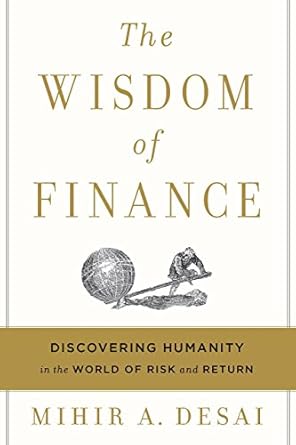More on this book
Community
Kindle Notes & Highlights
by
Mihir Desai
Read between
August 6, 2018 - February 10, 2019
For finance is, at its core, a way to understand the role of risk and randomness in our lives and a way to use the dominance of patterns to our advantage.
Finance, ultimately, is a set of tools for understanding how to address a risky, uncertain world.
Once you embrace randomness, you are left with the task of making sense of the world and seeking out the patterns that can guide your behavior.
Pragmatism is the opposite of navel-gazing; in pragmatism, truths are only valuable to the degree they can inform actions, and actions are only valuable if they confirm a truth.
Perceiving the normal in the abnormal is precisely what insurance is built on and it is what helps us achieve the opposite of chaos amidst the chaos of the world.
The logic of a liberal arts education is not terribly different—by preventing professional specialization at too early an age, exposure to a broad set of ideas flexes different intellectual muscles and provides alternative perspectives that feed a lifetime of learning.
In short, finance has a simple recipe for value creation—1) surpass the expected returns of your capital providers; 2) surpass those expectations for as long as you can; and 3) grow, so you can keep generating returns that are higher than your cost of capital. That’s all that really matters for creating value.
Finance is completely and ruthlessly forward-looking. The only source of value today is the future. The first step of valuation is to look forward and project what a company or investment will produce in the future.
We joked about how, as we get older, we appreciate more and more how influential our childhoods are—and then went back to our catty kvetching
Organizations that stigmatize failure actually tend to repeat failures rather than learn from them.
But underneath all of finance is this underlying idea: the pursuit of more will yield less and less. And any expectation other than that is not consistent with the ideas of finance. The game of accumulation is one that will leave one less and less satisfied as one gains more and more. To search for ever-greater satisfaction through accumulation is folly. That is the bedrock idea in finance. And it runs completely counter to how individuals in finance often act and how they are perceived. Why, then, does this bedrock idea of finance get lost amongst practitioners, as perceived by much of the
...more
how to assess risks through experience and imagination and how to use leverage to change the lives of the people she loves. She values diversification and sees option value, but doesn’t hesitate to make the big decision. She knows how value is created and she knows that she is ultimately only a steward for the capital she is entrusted with. She is filled with forgiveness for those around her who fail, and she knows her success is difficult to attribute to her skill. She is not addicted to risk-taking and does not develop insatiable desires. She remains invested in her deepest relationships
...more


